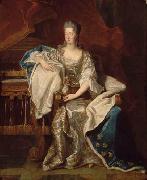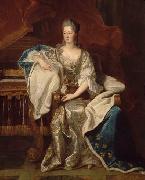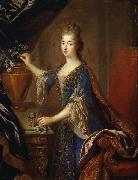Wholesale Oil Painting No Minimum |
|||||||||||
|
|
|||||||||||

|
|||||||||||
|
|
|
||||||||
Hyacinthe Rigaud1659-1743 French Hyacinthe Rigaud Gallery He was born Jacint Rigau i Ros [1] -- though in many encyclopaedias is "re-christened" with the name of H??acint Francesc Honrat Mathias Pere Martyr Andreu Joan Rigau -- in Perpignan, which became French (Treaty of the Pyrenees) a short time after his birth (November 7, 1659). In 1682, he was awarded the Prix de Rome. He was the most important portrait painter in the reign of King Louis XIV. His instinct for impressive poses and grand presentations precisely suited the tastes of the royal personages, ambassadors, clerics, courtiers, and financiers who sat for him. Because Rigaud's paintings captured very exact likenesses along with the subject's costumes and background details, his paintings are considered precise records of contemporary fashions. Rigaud was a master of the Baroque style of art. Rigaud's best-known work is his 1701 painting of Louis XIV which today hangs in the Louvre in Paris, as well as the second copy also requested by Louis XIV which is now at Versailles. In 1709 he was made a noble by his hometown of Perpignan. In 1727 he was made a knight of the Order of Saint Michael. Hyacinthe Rigaud died in Paris, France on December 27, 1743. |
||||||||
|
|
||||||||
Portrait of Marie Anne de Bourbon
Portrait of Marie Anne de Bourbon Painting ID:: 75856 |
1706
cjr 1706 cjr |
|||||||
|
|
||||||||
Hyacinthe Rigaud1659-1743 French Hyacinthe Rigaud Gallery He was born Jacint Rigau i Ros [1] -- though in many encyclopaedias is "re-christened" with the name of H??acint Francesc Honrat Mathias Pere Martyr Andreu Joan Rigau -- in Perpignan, which became French (Treaty of the Pyrenees) a short time after his birth (November 7, 1659). In 1682, he was awarded the Prix de Rome. He was the most important portrait painter in the reign of King Louis XIV. His instinct for impressive poses and grand presentations precisely suited the tastes of the royal personages, ambassadors, clerics, courtiers, and financiers who sat for him. Because Rigaud's paintings captured very exact likenesses along with the subject's costumes and background details, his paintings are considered precise records of contemporary fashions. Rigaud was a master of the Baroque style of art. Rigaud's best-known work is his 1701 painting of Louis XIV which today hangs in the Louvre in Paris, as well as the second copy also requested by Louis XIV which is now at Versailles. In 1709 he was made a noble by his hometown of Perpignan. In 1727 he was made a knight of the Order of Saint Michael. Hyacinthe Rigaud died in Paris, France on December 27, 1743. |
||||||||
|
|
||||||||
|
|
Portrait of Marie Anne de Bourbon
Portrait of Marie Anne de Bourbon Painting ID:: 77667 |
Date 1706(1706)
Medium Oil
cyf Date 1706(1706) Medium Oil cyf |
||||||
|
|
||||||||
Francois de TroyFrench Baroque Era Painter, 1645-1730 was a French painter and engraver who became principal painter to King James II in exile at Saint-Germain-en-Laye and Director of the Academie Royale de peinture et de sculpture. One of a family of artists, Troy was born in Toulouse, the son of Nicolas de Troy (1608 - 15 September 1684), a painter in that city,and was the brother of Jean de Troy (4 April 1638 - 25 June 1691).Troy was taught the basic skills of painting by his father, and perhaps also by the more worldly Antoine Durand. François de Troy is not to be confused with his son, the portrait painter Jean-François de Troy (1679-1752), who studied under him At some time after 1662, Troy went to Paris to study portrait painting under Claude Lefebvre (1633-1675) and Nicolas-Pierre Loir (1624 - C1679]. A. P. F. Robert-Dumesnil states that this occurred when Troy was aged twenty-four. In 1669, Troy married his master Nicolas-Pierre Loir's sister-in-law, Jeanne Cotelle. In 1671, he was approved by the Academie Royale de peinture et de sculpture. In 1674, he was received into the Academy as a history painter, with a reception piece (morceau de reception) entitled Mercure coupant la tete d'Argus ('Mercury cutting off the head of Argus'). Troy's early known works include tapestry designs for Madame de Montespan, one of the many mistresses of Louis XIV of France, and paintings with religious and mythological subjects. In the 1670s, he became friendly with Roger de Piles, who introduced him to Dutch and Flemish painting, |
||||||||
|
|
||||||||
|
|
Portrait of Marie Anne de Bourbon
Portrait of Marie Anne de Bourbon Painting ID:: 82929 |
1680(1680)
Medium Oil on canvas
Dimensions 50 x 39 cm (19.7 x 15.4 in)
cyf 1680(1680) Medium Oil on canvas Dimensions 50 x 39 cm (19.7 x 15.4 in) cyf |
||||||
|
|
||||||||
|
Francois de Troy French Baroque Era Painter, 1645-1730 was a French painter and engraver who became principal painter to King James II in exile at Saint-Germain-en-Laye and Director of the Academie Royale de peinture et de sculpture. One of a family of artists, Troy was born in Toulouse, the son of Nicolas de Troy (1608 - 15 September 1684), a painter in that city,and was the brother of Jean de Troy (4 April 1638 - 25 June 1691).Troy was taught the basic skills of painting by his father, and perhaps also by the more worldly Antoine Durand. François de Troy is not to be confused with his son, the portrait painter Jean-François de Troy (1679-1752), who studied under him At some time after 1662, Troy went to Paris to study portrait painting under Claude Lefebvre (1633-1675) and Nicolas-Pierre Loir (1624 - C1679]. A. P. F. Robert-Dumesnil states that this occurred when Troy was aged twenty-four. In 1669, Troy married his master Nicolas-Pierre Loir's sister-in-law, Jeanne Cotelle. In 1671, he was approved by the Academie Royale de peinture et de sculpture. In 1674, he was received into the Academy as a history painter, with a reception piece (morceau de reception) entitled Mercure coupant la tete d'Argus ('Mercury cutting off the head of Argus'). Troy's early known works include tapestry designs for Madame de Montespan, one of the many mistresses of Louis XIV of France, and paintings with religious and mythological subjects. In the 1670s, he became friendly with Roger de Piles, who introduced him to Dutch and Flemish painting, Portrait of Marie Anne de Bourbon 1680(1680) Medium Oil on canvas Dimensions 50 x 39 cm (19.7 x 15.4 in) cyf |
||||||||
|
|
||||||||
|
Prev Next
|
||||||||
|
|
||||||||
|
Related Paintings to Francois de Troy :. |
||||||||
|
|
||||||||
|
CONTACT US |



